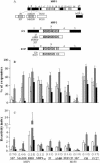Factors associated with immunoglobulin G subclass polarization in naturally acquired antibodies to Plasmodium falciparum merozoite surface proteins: a cross-sectional survey in Brazilian Amazonia
- PMID: 16829621
- PMCID: PMC1489569
- DOI: 10.1128/CVI.00095-06
Factors associated with immunoglobulin G subclass polarization in naturally acquired antibodies to Plasmodium falciparum merozoite surface proteins: a cross-sectional survey in Brazilian Amazonia
Abstract
We investigated immunoglobulin G (IgG) subclass antibody responses to Plasmodium falciparum merozoite surface protein 1 (MSP-1) and MSP-2 in 112 malaria-exposed subjects in Brazil. IgG3 polarization was primarily epitope driven, being little affected by cumulative or current exposure to malaria and not affected by a subject's age and Fcgamma receptor IIA genotype.
Figures

Similar articles
-
Immunoglobulin G subclass-specific responses against Plasmodium falciparum merozoite antigens are associated with control of parasitemia and protection from symptomatic illness.Infect Immun. 2009 Mar;77(3):1165-74. doi: 10.1128/IAI.01129-08. Epub 2009 Jan 12. Infect Immun. 2009. PMID: 19139189 Free PMC article.
-
Plasmodium falciparum: IgG subclass antibody response to merozoite surface protein-1 among Amazonian gold miners, in relation to infection status and disease expression.Exp Parasitol. 2005 Feb;109(2):124-34. doi: 10.1016/j.exppara.2004.12.002. Epub 2005 Jan 20. Exp Parasitol. 2005. PMID: 15687019
-
Differential antibody recognition of four allelic variants of the merozoite surface protein-2 (MSP-2) of Plasmodium falciparum.J Eukaryot Microbiol. 2001 Sep-Oct;48(5):556-64. doi: 10.1111/j.1550-7408.2001.tb00191.x. J Eukaryot Microbiol. 2001. PMID: 11596920
-
Comparative analysis of the profiles of IgG subclass-specific responses to Plasmodium falciparum apical membrane antigen-1 and merozoite surface protein-1 in naturally exposed individuals living in malaria hypoendemic settings, Iran.Malar J. 2015 Feb 5;14:58. doi: 10.1186/s12936-015-0547-0. Malar J. 2015. PMID: 25652589 Free PMC article.
-
Understanding naturally acquired immunity to Plasmodium falciparum malaria.Infect Immun. 2003 Feb;71(2):589-90. doi: 10.1128/IAI.71.2.589-590.2003. Infect Immun. 2003. PMID: 12540533 Free PMC article. Review. No abstract available.
Cited by
-
Population diversity and antibody selective pressure to Plasmodium falciparum MSP1 block2 locus in an African malaria-endemic setting.BMC Microbiol. 2009 Oct 15;9:219. doi: 10.1186/1471-2180-9-219. BMC Microbiol. 2009. PMID: 19832989 Free PMC article.
-
Naturally acquired humoral and cellular immune responses to Plasmodium vivax merozoite surface protein 9 in Northwestern Amazon individuals.Vaccine. 2008 Dec 2;26(51):6645-54. doi: 10.1016/j.vaccine.2008.09.029. Vaccine. 2008. PMID: 18832003 Free PMC article.
-
Development of quantitative suspension array assays for six immunoglobulin isotypes and subclasses to multiple Plasmodium falciparum antigens.J Immunol Methods. 2018 Apr;455:41-54. doi: 10.1016/j.jim.2018.01.009. Epub 2018 Jan 31. J Immunol Methods. 2018. PMID: 29397157 Free PMC article.
-
A threshold concentration of anti-merozoite antibodies is required for protection from clinical episodes of malaria.Vaccine. 2013 Aug 20;31(37):3936-42. doi: 10.1016/j.vaccine.2013.06.042. Epub 2013 Jun 22. Vaccine. 2013. PMID: 23800539 Free PMC article.
-
Immunoglobulin G subclass-specific responses against Plasmodium falciparum merozoite antigens are associated with control of parasitemia and protection from symptomatic illness.Infect Immun. 2009 Mar;77(3):1165-74. doi: 10.1128/IAI.01129-08. Epub 2009 Jan 12. Infect Immun. 2009. PMID: 19139189 Free PMC article.
References
-
- Boucharou-Tayoun, H., P. Attanath, A. Sabchareon, T. Chongcuphajaisiddi, and P. Druilhe. 1990. Antibodies that protect humans against Plasmodium falciparum blood stages do not on their own inhibit parasite growth and invasion in vitro, but act in cooperation with monocytes. J. Exp. Med. 172:1633-1641. - PMC - PubMed
-
- Cavanagh, D. R., and J. S. McBride. 1997. Antigenicity of recombinant proteins derived from Plasmodium falciparum merozoite surface protein 1. Mol. Biochem. Parasitol. 85:197-211. - PubMed
-
- Cavanagh, D. R., C. Dobaño, I. M. Elhassan, K. Marsh, A. Elhassan, L. Hviid, E. A. T. G. Kahalil, T. G. Theander, D. Arnot, and J. S. McBride. 2001. Differential patterns of human immunoglobulin G subclass responses to distinct regions of a single protein, the merozoite surface protein 1 of Plasmodium falciparum. Infect. Immun. 69:1027-1211. - PMC - PubMed
Publication types
MeSH terms
Substances
LinkOut - more resources
Full Text Sources
Research Materials

